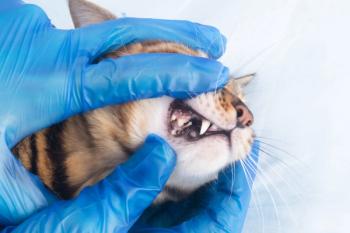
Virginia Tech and VCA research studies could help hyperthyroid cats
Veterinarians hope their clinical research will address major gaps in forms of treatment.
Greg Daniel (left), professor and head of the Department of Small Animal Clinical Sciences, and Tina Conway (right), veterinary internal medicine specialist at VCA Veterinary Referral Associates, hope their research on hyperthyroidism will help cats like Trixie, pictured here. (Photo courtesy of Virginia Tech).David Panciera, DVM, DACVIM, the Anne Hunter Professor of Medicine, and Wendy Morré, DVM, small animal medicine resident, are leading a clinical trial at the Veterinary Teaching Hospital in Blacksburg, Virginia, that uses scintigraphy to measure the severity of thyroid disease, according to a release from Virginia Tech.
“Traditionally, most places across the country who treat hyperthyroid cats with radioiodine give a fixed dose. While a fixed dose is effective in eliminating the hyperthyroidism, there is a concern that we are overtreating the cats,” says Greg Daniel, professor of radiology and head of the Department of Small Animal Clinical Sciences at the Virginia-Maryland Regional College of Veterinary Medicine.
Researchers at the veterinary college and Veterinary Centers of America (VCA) Veterinary Referral Associates in Gaithersburg, Maryland, are looking into this common form of treatment for hyperthyroid cats, which they say may be causing secondary problems for some while not working for others.
According to the release, Panciera and Morré are tailoring the dosage of radioiodine for cats enrolled in the study based on the intensity of radionuclide uptake and the size of the thyroid gland measured by scintigraphic study. Researchers at the college hope to provide objective criteria derived from other scintigraphic studies that showed improved treatment responses with altered dosages of radioiodine based on serum thyroid hormone levels.
“We are doing two studies in parallel. The veterinary college is looking at a series of radioiodine doses and will compare results with Dr. Conway, who used a different dose range,” says Daniel. “Eventually, we can combine the data so we can look at effectiveness across a broader range.”
Last fall, the researchers also teamed up with Tina Conway, DVM, DACVIM, a veterinary internal medicine specialist at VCA Veterinary Referral Associates. Conway was already using scintigraphy to capture images of the thyroid gland in her clinical practice and adjusted her methodology to match the college's approach so that her data can be used in the overall study, the release states.
“The ‘one dose fits all' approach results in an unacceptable number of treated cats-around 30 percent-becoming hypothyroid. By using the fixed dose, we tend to give more radioiodine than needed for a large portion of cats, yet for a small number of cats that remain hyperthyroid, we are giving less than we should,” says Daniel.
Newsletter
From exam room tips to practice management insights, get trusted veterinary news delivered straight to your inbox—subscribe to dvm360.






